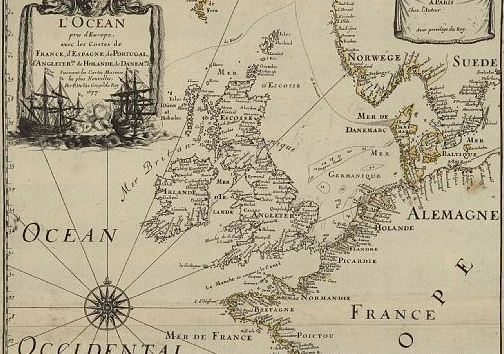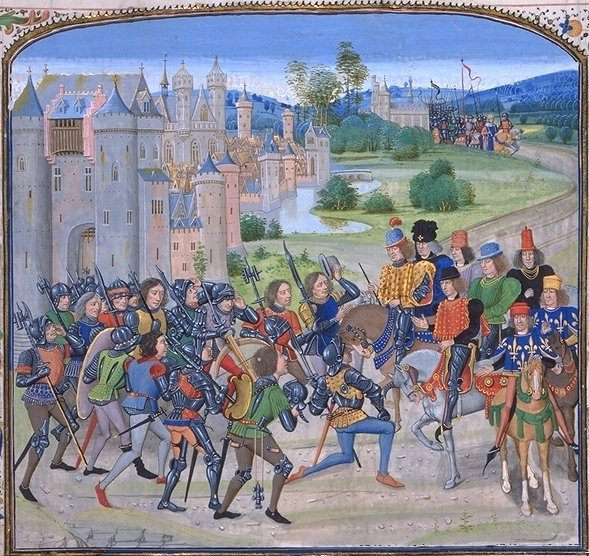From the Brink of the Apocalypse: Confronting Famine, War, Plague, and Death in the Later Middle Ages
Aberth writes in the tradition of Barbara Tuchman’s A Distant Mirror, both in his lively, readable style aimed at the nonspecialist and in his antiheroic, almost romantic portrayal of late medieval miseries.
Strategic Insights: The Battle of Crecy
This paper will explore and analyze strategic decision making by Edward III, King of England, and Philip VI, King of France, at the Battle of Crecy using the critical thinking model as a conceptual framework, in conjunction with egocentrism and sociocentrism as the two main cognitive frames of reference.
The Efficacy of the English Longbow: A Reply to Kelly DeVries
According to DeVries, historians (myself specifically included) who argue for the lethal efficacy of the longbow are committing the sin of technological determinism, and indeed ‘have done military history and the history of technology a disservice’…
Chacun son Guesclin : La réception des quatre versions de l’oeuvre de Cuvelier entre 1380 et 1480
The goal of the present thesis is to study the reception of the Chanson de Bertrand du Guesclin by Cuvelier from the time of its creation around 1385 up to the publication in print of one of its prose versions around 1480.
The Loss of Ponthieu: Nationalism or Particularism
The birth of European nationalism from amidst the carnage of the Hundred Years War has become one of the truisms of medieval history.
Inter-frontal Cooperation in the Fourteenth Century and Edward III’s 1346 Campaign
In this article I will endeavour to fill this gap, and examine to what extent medieval commanders campaigning on different fronts could have cooperated with each other in pursuit of a common plan, and what was the potential importance of such cooperation.
The military and administrative leadership of the Black Prince
Edward of Woodstock, Prince of Wales and Aquitaine, has been analyzed on many different levels for his military genius in battle during the Hundred Years War.
The Efficacy of the English Longbow: A Reply to Kelly DeVries
The Efficacy of the English Longbow: A Reply to Kelly DeVries By Clifford Rogers War in History, Vol.5:2 (1998) Introduction:Every profession needs its…
French Noble Archers from the lists of those appearing for royal musters from about 1420 to 1560
French Noble Archers from the lists of those appearing for royal musters from about 1420 to 1560 By James Prescott Published Online, 2011…
Birgitta of Sweden and the Divine Mysteries of Motherhood
Birgitta of Sweden and the Divine Mysteries of Motherhood Stjerna, Kirsi Feminist Forum, 24, no. 1 (1997) Abstract St. Birgitta of Sweden is…
The Treaty of Windsor (1386) in a European context
In the early evening of Monday 14 August 1385, between 6 and 7 p.m., a crushing defeat was inflicted by a Portuguese army on a numerically far superior and better-equipped Castilian force.
Sir John Hawkwood: Story of a Condottiere
Sir John Hawkwood: Story of a Condottiere By John Temple-Leader and Giuseppe Marcotti (London, 1889) Chapter 1: On the left bank of the…
War financing in the late-Medieval Crown of Aragon
War financing in the late-Medieval Crown of Aragon Kagay, Donald J. (Albany State University) The Journal of Medieval Military History, Volume 6 (2008)…
The Use of Gunpowder Weaponry by and Against Joan of Arc During the Hundred Years War
This article explores the possibility of a link between Joan of Arc and evolution of gunpowder weaponry during the Hundred Years War, a thesis for which there is some evidence.
Jeanne d’Arc: Morale, Spiritual Authority, and Gunpowder
Few people in history have had more written about them than Jeanne d’Arc. This young woman has been claimed by French Nationalists, the Catholic church, and radical feminists alike; she has been portrayed variously as saint, heretic, schizophrenic, war heroine, virgin, and tart.
The Military Revolutions of the Hundred Years’ War
The Military Revolutions of the Hundred Years’ War By Clifford J. Rogers The Journal of Military History, Vol.57 (1993) Extract: I believe, however,…
The Auld Alliance (1295-1560) : Commercial Exchanges, Cultural and Intellectual Influences Between France and Scotland
The Auld Alliance (1295-1560) : Commercial Exchanges, Cultural and Intellectual Influences Between France and Scotland By Muriel Canallas MA Thesis, Universite de Toulon et…
How accurate were medieval chroniclers in describing warfare?
The Battle of Margate is one of the lesser-known episodes of the Hundred Years’ War, but a historian has recently analyzed this naval…
Genre as Context in the Alliterative Morte Arthure
Genre as Context in the Alliterative Morte Arthure Whetter, K.S. Arthuriana 20.2 (2010) Abstract Genre remains an important context for teaching and understanding literature.…
Friendly Fire: The Disastrous Politics of Friendship in the Alliterative Morte Arthure
Friendly Fire: The Disastrous Politics of Friendship in the Alliterative Morte Arthure Chism, Christine Arthuriana 20.2 (2010) Abstract This article counterposes the Alliterative Morte…
Conquest, Crusade and Pilgrimage: The Alliterative Morte Arthure in its Late Ricardian Crusading Context
Conquest, Crusade and Pilgrimage: The Alliterative Morte Arthure in its Late Ricardian Crusading Context Nievergelt, Marco Arthuriana 20.2 (2010) Abstract This article explores…
Three Views of John of Gaunt, Duke of Lancaster
Three Views of John of Gaunt, Duke of Lancaster Rocke, Sean Published Online ~ Course: British Studies (ID 382), Harlaxton College, Spring (2011) Abstract John…
Ideals and values in Jean Froissart’s Chroniques
Froissart left a large range of writings: numerous poems, and Méliador, an Arthurian roman. However, the most widely read work is his chronicles, which amongst other things recount the events of the Hundred Years War between France and England and their respective allies, the dealings and life at the court of the Count de Foix, popular uprisings in England, Flanders and France, and the downfall of the English King, Richard II.
The Military Archery at Neville’s Cross, 1346
The Military Archery at Neville’s Cross, 1346 By Robert Hardy The Battle of Neville’s Cross, 1346, edited by David Rollason and Michael Prestwich…
Reforming England’s ‘harde covetouse hert’: William Worcester and the diagnosis of defeat
Reforming England’s ‘harde covetouse hert’: William Worcester and the diagnosis of defeat Halsey, Catherine York Medieval Yearbook, ISSUE No. 1, (2002) Abstract By 1450…






